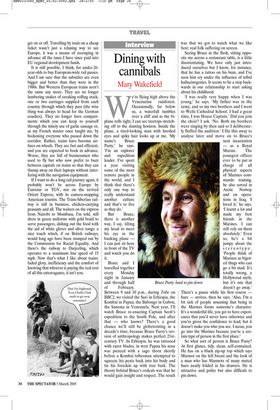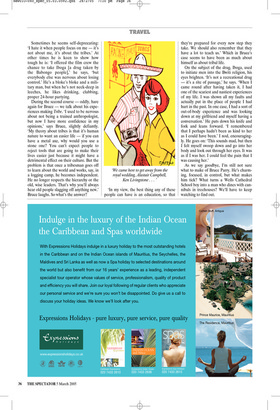Dining with cannibals
Mary Wakefield
We’re flying high above the Venezuelan rainforest. Occasionally, far below us, a waterfall tumbles over a cliff and as the biplane rolls right, I can see treetops stretching off to the slanting horizon. Inside the plane, a tired-looking man with hooded eyes and spiky hair looks up at me. ‘My name’s Bruce Parry,’ he says. ‘I’m an explorer and expedition leader. I’ve spent a year visiting some of the most remote people in the world, and I think that there’s only one way to really understand another culture and that’s to live as they do.’ But Bruce, there is another way, I say, tilting my head to meet his eye in the banking plane I can just sit here in front of the TV and watch you do it.
Bruce and I travelled together every Monday night in January and through half of February. Between 9 and 10 p.m., during Tribe on BBC2, we visited the Suri in Ethiopia, the Kombai in Papua, the Babongo in Gabon, the Sanema in Venezuela. Next year, I’ll watch Bruce re-enacting Captain Scott’s expedition to the South Pole, and after that — who knows? There’s a good chance we’ll still be globetrotting in a decade’s time, because Bruce Parry’s version of anthropology makes perfect 21stcentury TV. In Ethiopia, he was tattooed with razor blades, in west Papua his nose was pierced with a sago thorn shortly before a Kombai tribesman attempted to squeeze his penis back into his body and tie his foreskin up with tree bark. The theory behind Bruce’s ordeals was that he would gain insight and respect. The result was that we got to watch what we like best: real folk suffering on screen.
Seeing Bruce in the flesh, sitting opposite me across a restaurant table, is a little disorientating. We have only just introduced ourselves but I know, for instance, that he has a tattoo on his bum, and I’ve seen him cry under the influence of tribal hallucinogenics. It seems to be a step backwards in our relationship to start asking about his childhood.
‘I was really very happy when I was young,’ he says. ‘My father was in the army, and so my two brothers and I went to Wells Cathedral School. I had a great time, I was House Captain.’ Did you join the choir? I ask. ‘No. Both my brothers were singing by then and so I deliberately fluffed the audition.’ I file this away to analyse later and move on to Bruce’s next incarnation — as a Royal Marine. The youngest officer ever to be put in charge of all physical aspects of Marines commando training, he also served in Arctic Norway and on operations in Iraq. ‘I loved it,’ he says. ‘I learnt a lot and made my best friends in the Marines. I can still rely on them absolutely.’ Even so, he’s a bit jumpy about the stereotype. ‘People think of Marines as bigoted thugs who can go a bit mad. It’s totally wrong, a Hollywood myth, but it’s one that doesn’t go away.’ There’s a pause while his first course hare — arrives, then he says, ‘Also, I’m a bit sick of people assuming that being in the Marines forms someone’s character. It’s a wonderful life, you get to have experiences that you’d never have otherwise and you’re given the confidence to lead, but it doesn’t make you who you are. I mean, you go into the Marines because you’re a certain type of person in the first place.’ So what sort of person is Bruce Parry? At first glance, tidy, clean, self-contained. He has on a black zip-up top which says Marmot on the left breast and the look of a man who has Marmots of many muted hues neatly folded in his drawers. He is attractive and polite but also difficult to pin down. Sometimes he seems self-deprecating: ‘I hate it when people focus on me — it’s not about me, it’s about the tribes.’ At other times he is keen to show how tough he is: ‘I offered the film crew the chance to take Iboga [a drug taken by the Babongo people],’ he says, ‘but everybody else was nervous about losing control.’ He’s a bloke’s bloke and a military man, but when he’s not neck-deep in leeches, he likes drinking, clubbing, proper 24-hour partying.
During the second course — oddly, hare again for Bruce — we talk about his experiences making Tribe. ‘I used to be nervous about not being a trained anthropologist, but now I have more confidence in my opinions,’ says Bruce, slightly defiantly. ‘My theory about tribes is that it’s human nature to want an easier life — if you can have a metal axe, why would you use a stone one? You can’t expect people to reject tools that are going to make their lives easier just because it might have a detrimental effect on their culture. But the problem is that once a tribesman goes off to learn about the world and works, say, in a logging camp, he becomes independent. He no longer respects the hierarchy or the old, wise leaders. That’s why you’ll always hear old people slagging off anything new.’ Bruce laughs. So what’s the answer? ‘In my view, the best thing any of these people can have is an education, so that they’re prepared for every new step they take. We should also remember that they have a lot to teach us.’ Which in Bruce’s case seems to have been as much about himself as about tribal life.
On the subject of the drug, Iboga, used to initiate men into the Bwiti religion, his eyes brighten. ‘It’s not a recreational drug — it’s a rite of passage,’ he says. ‘When I came round after having taken it, I had one of the scariest and nastiest experiences of my life. I was shown all my faults and actually put in the place of people I had hurt in the past. In one case, I had a sort of out-of-body experience and was looking down at my girlfriend and myself having a conversation.’ He puts down his knife and fork and leans forward. ‘I remembered that I perhaps hadn’t been as kind to her as I could have been.’ I nod, encouragingly. He goes on: ‘This sounds mad, but then I felt myself swoop down and go into her body and look out through her eyes. It was as if I was her. I could feel the pain that I was causing her.’ As we say goodbye, I’m still not sure what to make of Bruce Parry. He’s charming, focused, in control, but what makes him tick? What turns a Wells Cathedral School boy into a man who dines with cannibals in treehouses? We’ll have to keep watching to find out.



























































 Previous page
Previous page